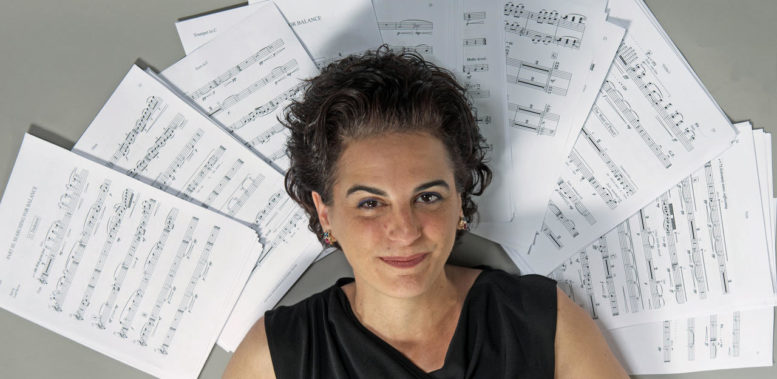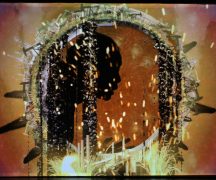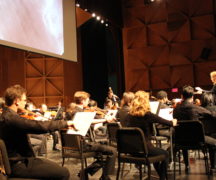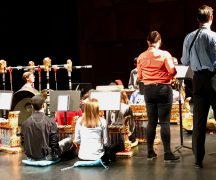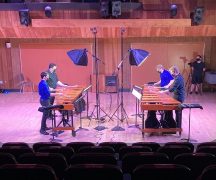By DAVID DUPONT
BG Independent News
When Stacy Garrop was pursuing her studies in composition, she’d see the posters for the New Music Festival at Bowling Green State University and check the names of the featured guest composers.
“I would always look to see who was programmed every year at BG at the New Music Festival,” she said, and she’d think: “Maybe someday. That would be amazing. That day is today. … It’s a great honor to be featured guest composer.”
Garrop will be on campus this week in that role. Her compositions will be performed on six of the eight festival concerts, starting with the American Brass playing “Helios” on Wednesday, Oct. 12, at 8 p.m. in Kobacker Hall. The festival will conclude with a concert by the Bowling Green Philharmonia, Saturday, Oct. 15 at 8 p.m. in Kobacker. The final piece on that program will be Garrop’s “The Battle of the Ballot,” composed in honor of the 100th anniversary of women’s suffrage. Throughout the week will be pieces for musicians performing solo or in a variety of configurations by Garrop and by other contemporary composers from near and far.
Click for the festival schedule.
Garrop will speak about her work, and her career as a freelance professional composer during her composer’s talk Thursday, Oct. 13 at 1:30 p.m. in Bryan Recital Hall.
During a telephone interview conducted before the full schedule was posted, Garrop admitted she wasn’t sure which versions of certain pieces would be played.
Would “Phoenix Rising,” programmed for Concert #5 in Kobacker Friday at 2:30, be the original version for soprano saxophone or a version for clarinet or flute or, the most recent, for violin? Well, Terri Sanchez will play the flute version.
While some composers hear their pieces for specific instruments and deign not to transpose them or rearrange them, Garrop said, “my ear is very adaptable.”
Even a piece written for strings, full of special effects for those instruments, can be translated for wind ensemble.
On Concert #4, Friday at 10:30 a.m. violinist Caroline Chin and pianist Laura Melton will perform “Solitude of the Stars.”
That piece, Garrop said, started as the third movement of “Postcards from Wyoming” for a sextet. During the pandemic her husband, Joseph Francavilla, a pianist, needed pieces for a project for his students. He recorded a daily piano solo. Garrop contributed a solo piano arrangement of “Solitude.”
Then someone else reached out and asked for a piece that could be recorded virtually. Another version “Solitude.” Once performers saw what she was during they started requesting their own versions. To date there have been 20. The latest is a vocal quartet. The composer’s goal is for 25.
This is in part of the business end of being a freelance composer. The more pieces she has in circulation, for more instruments, translates into more performances, and more revenue.
Garrop started on this path when she was 15, growing up in the Bay area of California. She sang in choirs and played piano, and then alto saxophone in high school marching band. When she took a music theory course with her band director, he asked students to go home and compose a piece of music.
“It was like a light bulb turned on in my head to show a room I’d never seen before, and then I couldn’t turn it off,” she said. She started composing piece . after piece.
A family friend took note and suggested she study with a composer he knew. “To have a teacher to make sense of what I was doing was amazing,” Garrop said.
“It was a pretty short turnaround from there to realizing this is what I wanted to do in my life and to work up the skill sets to get into college and be able to compete with people who had been preparing for this for many more years.”
She felt that sense of needing to catch up all through her studies starting at the University of Michigan, and continuing at the University of Chicago, where she studied with Shulamit Ran, who was guest composer at the 2004 New Music Festival, and then earning her doctorate at the University of Indiana.
Garrop returned to Chicago to teach at Roosevelt University. She taught there for 16 years, earning tenure. But at some point, she realized she couldn’t have it all. She read the essay she’d written when applying to grad school in which she “laid out what I wanted to do with my future.” She realized that her career had morphed into something else. “I was way off course .”
So in 2015, she quit academia and became a freelance composer.
“My musical language has never been overly academic,” Garrop said. “When I was at the University of Chicago I knew exactly what it sounded like to be highly academic, and I made the decision as I left University of Chicago that that type of language is not where I find the importance in the work.”
The formal structure of her compositions is built around tension and relaxation. “How do you move the music over high points and low points?”
She turned to composers George Crumb and Dmitri Shostakovich as models.
When she gets a commission, she asks the performers what’s on their minds, what’s important to them.
“The Battle for the Ballot” was commissioned by Cristian Măcelaru for the Cabrillo Festival in 2019. It was conceived as a concerto for narrator, who recites the words of seven suffragists, four White and three Black.
But the 2020 live premiere was canceled because of the pandemic. Garrop completed the piece, and Măcelaru ended up recording it virtually.
Recently Garrop has put together a slide show from images from the Library of Congress.
The BG Philharmonia will play the chamber version created for Marin Alsop and the Baltimore Symphony that allowed them to perform it live outside with the musicians socially distanced.
The creativity demonstrated by performers through the pandemic was inspiring, Garrop said. Without it “I don’t know what would happen to any of us.”
Another tribute to a female hero will be on festival Concert #2, Thursday at 3:30 p.m. in Bryan Recital Hall, when baritone Keith Phares with pianist Kevin Bylsma perform Garrop’s “My Dearest Ruth,” based on writing by Martin Ginsburg, the husband of Ruth Bader Ginsburg.
Garrop plans to offer advice for students during her composer’s talk.
“You can start making your career right now,” she said. “Maintain your website. Network with student composers, musicians and conductors because those relationships will carry you throughout your career.”
And, most important: “You have to believe in yourself before you expect anyone else to believe in you. If you don’t have that, you don’t have anything at all.”

